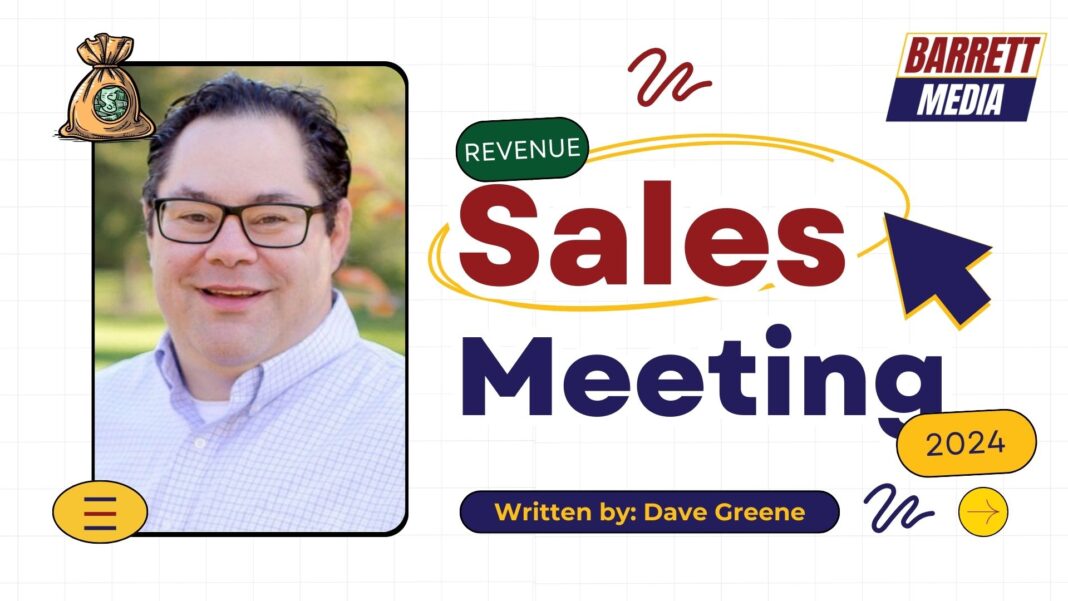Barrett Media produces daily content on the music, news, and sports media industries. To stay updated, sign up for our newsletters and get the latest information delivered straight to your inbox.
What a great time to be in sports! With everything going on and interest incredibly high, hopefully we are all using that to our advantage. Let’s get our sales meeting kicked off and this week we are going to talk about career advancement. I know there are some of you that want to know about possible next steps, perhaps as a sales manager and maybe even beyond to becoming a General Manager or even higher.
I listened to a great new podcast this week called ‘Glue Guys’ with Shane Battier, Alex Smith and Ravi Gupta. In the first episode, Smith talks about the differences between being an Offensive Coordinator and being a head coach. He explains, the talents it takes to be a good coordinator have absolutely nothing to do with the talents that it takes to be a head coach. He uses Dan Campbell as an example, who couldn’t get a head coaching job because he hadn’t been a coordinator and doesn’t ‘look the part.’ However, as many knew, Campbell is a great leader and that is what makes him a great head coach of the Detroit Lions.
This is very similar to the difference between being in sales and excelling at it and being a sales manager and excelling at it. While you still do plenty of selling as a manager, you are mostly now dealing with your team. As I have said many times over the years, when you are in sales your problems are your problems. When you are in sales management, everybody’s problems are your problems.
When you are a head coach in football, you are not coaching players most of the time. It used to just be this way in the pros but now it is the same in college as well with NIL and dealing with the transfer portal. I recently heard Urban Meyer say that he spoke with Ohio State head coach Ryan Day recently who said he spends less than 25% of his time coaching the team and the rest dealing with everything else like recruiting players over and over again, dealing with their NIL needs and talking to the media. You are a delegator, and you have to be, or it will never all get done.
As a manager you have to be a leader. You have to be aware of what is happening around you and you have to really get to know your staff so you can figure out how to manage each individual. There is no one-size-fits-all in management. You have to adjust.
You have to be patient, be very communicative, you have to have good listening skills and good problem-solving skills. And, no matter what, you have to remain positive and have a look of confidence about you, suggesting to others that no matter what is in the way, you have a plan and will help lead the way out of whatever the situation is.
When you are the manager, everyone is looking to you for the way you respond to things. A salesperson comes in and just lost a major client. You as the manager just lost a ton of billing you can’t make up right away, you want to punch a wall. The way you respond to that salesperson can make all the difference in how everyone in your office handles the situation.
If you talk through it, if you coach up the salesperson, if you offer to work through the problem with them and make them feel like they aren’t alone, you can get through it together. If your response is to yell “WTF!” and get angry and act like the world just ended, good luck getting that seller’s confidence back and plan on needing to intervene as the person just went out to the sales pit and brought everyone down with them.
But it isn’t just the big things, it’s a lot of little things. Jim says Joan is too loud on the phone. Kim thinks Bob is using Salesforce to prospect her clients. John says Tony is faking calls and sleeps in his car. Ed the production guy is sick, and nobody can get spots recorded. Sarah in traffic says the sales reps are messing up orders and now the log is going to be late for the next day. And on and on and on. Some people thrive in those situations, and some would much rather be in front of a client pitching business than dealing with Kim’s paranoia about Bob looking at her information in Salesforce.
For a lot of people, managing is really not what they want to do, they just think it is a logical next step. It is well known in the industry that the best salespeople rarely make the best managers. That is no different, by the way, in sports a lot of the time. Remember Magic Johnson the head coach? He is just one of several examples where the best players have a hard time coaching others. Some people just have the god given abilities in sports or in sales, and they simply expect that others will have the same type of work ethic, understanding, passions and more. It just doesn’t work that way.
Sometimes, you really have to manage someone. You have to dig in and find out what the real problems are. You have to be part manager but also part psychologist and mind reader. It is no different than a client CNA. What is it this salesperson is really struggling with and how can I help that person be better?
Is it a prospecting problem? Is it a problem reaching out to people or meeting people? Or is it a problem doing good needs analysis meetings? Is the problem taking what was learned in that meeting and turning it into great solutions? Is it a problem pitching ideas to the client? Or is it a closing problem?
You not only have to work to find the answers, but you also have to help with the solution and sometimes that means simply doing it with them or even for them in some cases. One of the best moves I ever saw a sales manager make was when he had a couple people sitting in the office, when he asked why they weren’t out on calls.
The answer was that they were struggling to reach people and get appointments. He dug in. He wanted to see the lists they were working off of, what product they were focused on selling and what prep they had done before they started. When he didn’t get great answers, he realized the truth was, they didn’t have a prepared list, they were looking things up on the internet and mostly emailing and sending messages through LinkedIn one by one.
He said he was going to sit and listen and watch for a bit to see if he could pick up on anything he might be able to help with. After they each made a couple of calls, he brought them both into the conference rooms. He wanted to try and nip the issue in the bud immediately. So, he went through a quick lesson on the best ways to prospect and the way you should pick a category, have an idea, and then make a list of everyone you wanted to call in that category.
He reviewed what to say on the phone or in emails to get people’s attention. The manager talked about how to ask for the decision maker and how to leave a message if you get a voicemail. He told them what he wanted but then he went a step further and he showed them. He actually made two calls right in front of them and then turned it over to them and had them do it.
I later asked him about it, and he said the first thing was he knew they were lying to him, they just weren’t doing the work it would take to get appointments. Then when he heard them make calls, he realized they were scared to make those calls and were going to fail if he didn’t step in and try and fix the problem right away. This was difficult to do, time consuming, but it had to be done, and this was great managing.
Servitude leadership is how media sales managers are successful and that means having to do some of the job for everyone, every day, all day. Then, if things don’t go well, you are the leader, so it is you they blame.
And for all of that, they pay you less than you can make in sales, and you have three times as many meetings.
So, are you sure you want to be a sales manager?

Dave Greene is the Chief Media Officer for Barrett Media. His background includes over 25 years in media and content creation. A former sports talk host and play-by-play broadcaster, Dave transitioned to station and sales management, co-founded and created a monthly sports publication and led an ownership group as the operating partner. He has managed stations and sales teams for Townsquare Media, Cumulus Media and Audacy. Upon leaving broadcast media he co-founded Podcast Heat, a sports and entertainment podcasting network specializing in pro wrestling nostalgia. To interact, find him on Twitter @mr_podcasting. You can also reach him by email at Dave@BarrettMedia.com.








